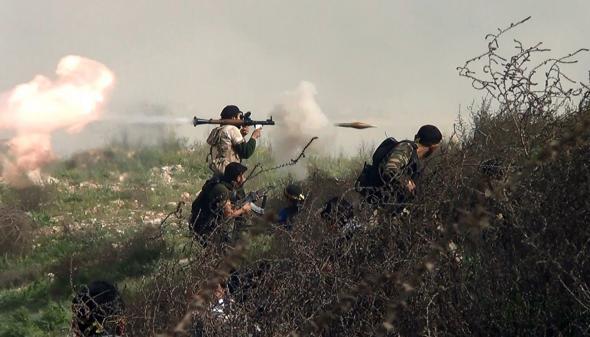The Obama administration is requesting $500 million from Congress to train and equip “appropriately vetted” Syrian opposition groups to fight against both Bashar al-Assad’s government and the Islamic State of Iraq and Syria. The CIA has been providing covert aid to the rebels for a while now, but this direct military involvement would be a major escalation in U.S. involvement in the conflict.
The administration was hinting that this was coming even before the situation across the border in Iraq spiraled out of control, but I would imagine there’s also an added political incentive now to make clear that the U.S. is in no way collaborating with Assad to stamp out ISIS.
The idea now seems to be that Iraqi forces—with the support of U.S and Iranian drones and advisers and now some new Russian military jets—along with beefed-up Syrian “moderate” rebels and, whether we admit it or not, Assad’s forces, will work in tandem if not together to contain ISIS’s spread.
My first response to the development is that it seems like that sort of thing that—if we were going to do it at all—should have been done in 2011, when the opposition to Assad was less fragmented and the devastation done to the country less severe. It’s not clear at this point what exactly the new aid would include, but I’m skeptical that it would be enough to permanently turn the tide against Assad and could only prolong a conflict that has already killed more than 162,000 people and caused more than 2.5 million to flee.
Given the atrocities he has committed, it is an unpalatable notion, but we may be fast approaching—if we haven’t already passed—the point at which the humanitarian and regional stability consequences of continuing to support the fight against Assad outweigh those of accepting that he will remain in power.
I would also hope that before authorizing these funds, Congress presses the administration to explain why the $500 million given to the rebels to fight ISIS will be more effective than the billions spent on training and equipping the Iraqi army that crumbled before them this month.
The question becomes even more pressing given the nearly $5 billion that the president wants to fund counterterrorism training in several countries. (Remember when we were pivoting away from the Middle East?)
So far there’s not a whole lot of detail in the plan, but given the track record of security assistance in Iraq and the support given thus far to the Syrian rebels, it’s hard to avoid the fear that we’re throwing good money after bad.
